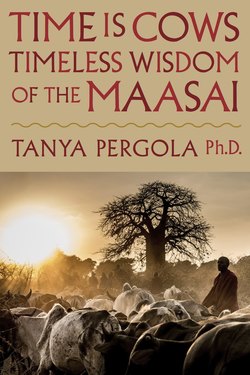Читать книгу Time is Cows: Timeless Wisdom of the Maasai - Tanya Pergola Ph.D. - Страница 6
На сайте Литреса книга снята с продажи.
PLANTING SEEDS
ОглавлениеMy African adventure may have begun on the summit of Mt. Kilimanjaro, but the real journey began when I returned to the United States. I arrived back in Seattle in early October 1999, and in more ways than one, I was out of sorts. What a case of poor planning I had done: two days before I’d been sunning on the beach in Zanzibar, and now here I was, waking wrapped up in a down duvet and listening to the rain steadily fall on the roof of my Seattle home.
Dressed in wool and fleece, I headed over to the University of Washington, where I was advising students in the Environmental Studies program. On the way to an appointment, I stopped at the university bookstore, hoping to find some comfort in old, familiar surroundings. I studied a wall of books written by authors scheduled to speak in Seattle in the coming weeks. Every other title seemed to have something to do with “individual freedom,” “self-help,” or “becoming independent.” My sour mood worsened when I thought, “What’s so great about working hard enough to survive completely alone in this world?” Sure, the foundational values of freedom and liberty that are forged into the American psyche are important, but had we gone too far? What were we freeing ourselves from? Was it making us any happier?
Later that day, one of the co-directors of the Environmental Studies program overheard me sharing with a student some of my experiences with wildlife management and traditional communities in Tanzania and he stopped and asked, “Tanya, are you going to listen to Wangari Maathai speak this evening?”
“What? She’s here?” I replied. And the day instantly began to improve.
I had been a big fan of Wangari’s work with women in Kenya for some time. A number of the books I had read on the environmental movement and ways to curb radical climate change mentioned the organization she founded, The Greenbelt Movement. Wangari had left her position as a professor at the University of Nairobi to work at the grassroots, helping to empower women, psychologically and economically, and had brilliantly focused on planting trees as the primary means to do so. (Twenty-seven years and thirty million trees later, Wangari and the Greenbelt Movement would be awarded the Noble Peace Prize in 2004.)
Wangari Maathai and I in Arusha in 2008, three years before she passed away
But in 1999, what in the world was this wonderful woman doing in Seattle? The University of Washington wasn’t known to be particularly strong in the field of African Studies at the time. But my colleague explained that Wangari was also participating at a workshop on African issues on nearby Whidbey Island the following weekend. He was on the board of the organization hosting the event, he said, and he would be happy to inquire whether I could attend as well. I’d be delighted, I told him. It would be lovely to be in the presence of such interesting people—and to connect to Africa again as the long and rainy Northwest winter commenced.
I hadn’t truly had a role model since I was twelve and Nadia Comaneci, the young Romanian, had been the first gymnast ever to receive a perfect score of ten in the Olympics—something an aspiring gymnast like me believed was a super-human achievement.
When Wangari Maathai walked into the room at the university that evening, it was as if Mother Earth herself entered. Her face glowed and her eyes had the intensity and sparkle I remembered seeing in many of the people I recently had met in Tanzania. Wangari had been the first East African woman to receive a Ph.D. Her own bloodline was Kikuyu-Maasai, and she spoke phrases similar to those I had been using in my Environmental Studies and Social Change courses: “We don’t need any more research. We know what is wrong. We need to act.” That evening, Wangari seemed to cut down all the ongoing debates on development aid, foreign policy in the Third World, and ways to heal from colonialism with a scythe and got right to the point. We simply needed to plant more trees. It had been a very long time since I had been so inspired.
I walked up to Wangari after her talk and began a conversation. We connected immediately. I was very weary of writing an endless string of papers suggesting better local and global policies for environmental conservation practices. My pilot light, my Russian-Italian passion flame, by now flickered very low as a result of over-thinking any number of problems. Yet this African earth mother gave me new clues on how to re-ignite it. She invited me to return to East Africa, to see how things really were on the ground, to put theory into practice—and to learn from her people.
And I couldn’t help but answer her call.
